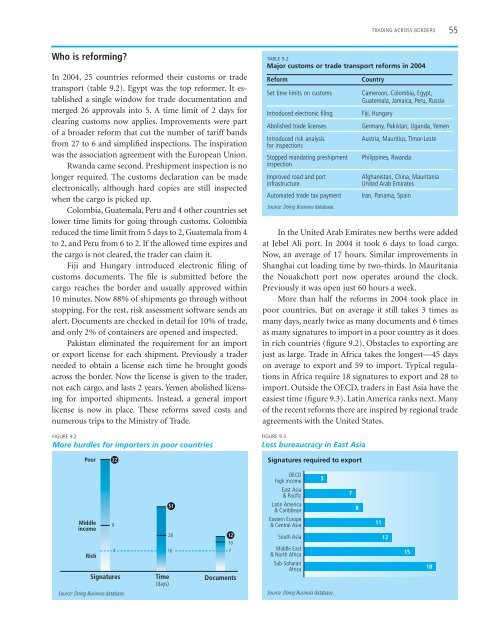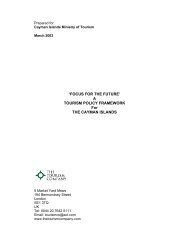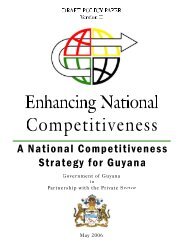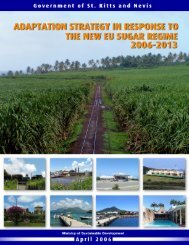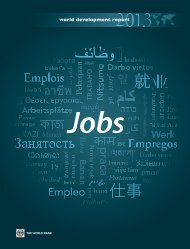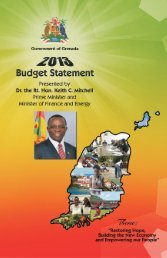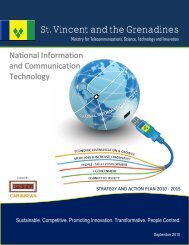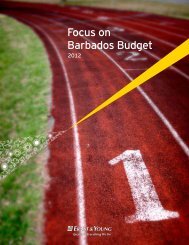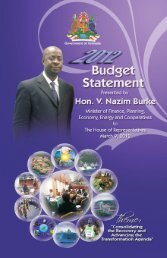Creating
Doing Business in 2006 -- Creating Jobs - Caribbean Elections
Doing Business in 2006 -- Creating Jobs - Caribbean Elections
Create successful ePaper yourself
Turn your PDF publications into a flip-book with our unique Google optimized e-Paper software.
TRADING ACROSS BORDERS 55<br />
Who is reforming?<br />
In 2004, 25 countries reformed their customs or trade<br />
transport (table 9.2). Egypt was the top reformer. It established<br />
a single window for trade documentation and<br />
merged 26 approvals into 5. A time limit of 2 days for<br />
clearing customs now applies. Improvements were part<br />
of a broader reform that cut the number of tariff bands<br />
from 27 to 6 and simplified inspections. The inspiration<br />
was the association agreement with the European Union.<br />
Rwanda came second. Preshipment inspection is no<br />
longer required. The customs declaration can be made<br />
electronically, although hard copies are still inspected<br />
when the cargo is picked up.<br />
Colombia, Guatemala, Peru and 4 other countries set<br />
lower time limits for going through customs. Colombia<br />
reduced the time limit from 5 days to 2, Guatemala from 4<br />
to 2, and Peru from 6 to 2. If the allowed time expires and<br />
the cargo is not cleared, the trader can claim it.<br />
Fiji and Hungary introduced electronic filing of<br />
customs documents. The file is submitted before the<br />
cargo reaches the border and usually approved within<br />
10 minutes. Now 88% of shipments go through without<br />
stopping. For the rest, risk assessment software sends an<br />
alert. Documents are checked in detail for 10% of trade,<br />
and only 2% of containers are opened and inspected.<br />
Pakistan eliminated the requirement for an import<br />
or export license for each shipment. Previously a trader<br />
needed to obtain a license each time he brought goods<br />
across the border. Now the license is given to the trader,<br />
not each cargo, and lasts 2 years. Yemen abolished licensing<br />
for imported shipments. Instead, a general import<br />
license is now in place. These reforms saved costs and<br />
numerous trips to the Ministry of Trade.<br />
<br />
<br />
TABLE 9.2<br />
Major customs or trade transport reforms in 2004<br />
Reform<br />
Set time limits on customs<br />
Introduced electronic fi ling<br />
Abolished trade licenses<br />
Introduced risk analysis<br />
for inspections<br />
Stopped mandating preshipment<br />
inspection<br />
Improved road and port<br />
infrastructure<br />
Automated trade tax payment<br />
Source: Doing Business database.<br />
Country<br />
Cameroon, Colombia, Egypt,<br />
Guatemala, Jamaica, Peru, Russia<br />
Fiji, Hungary<br />
Germany, Pakistan, Uganda, Yemen<br />
Austria, Mauritius, Timor-Leste<br />
Philippines, Rwanda<br />
Afghanistan, China, Mauritania<br />
United Arab Emirates<br />
Iran, Panama, Spain<br />
In the United Arab Emirates new berths were added<br />
at Jebel Ali port. In 2004 it took 6 days to load cargo.<br />
Now, an average of 17 hours. Similar improvements in<br />
Shanghai cut loading time by two-thirds. In Mauritania<br />
the Nouakchott port now operates around the clock.<br />
Previously it was open just 60 hours a week.<br />
More than half the reforms in 2004 took place in<br />
poor countries. But on average it still takes 3 times as<br />
many days, nearly twice as many documents and 6 times<br />
as many signatures to import in a poor country as it does<br />
in rich countries (figure 9.2). Obstacles to exporting are<br />
just as large. Trade in Africa takes the longest—45 days<br />
on average to export and 59 to import. Typical regulations<br />
in Africa require 18 signatures to export and 28 to<br />
import. Outside the OECD, traders in East Asia have the<br />
easiest time (figure 9.3). Latin America ranks next. Many<br />
of the recent reforms there are inspired by regional trade<br />
agreements with the United States.


